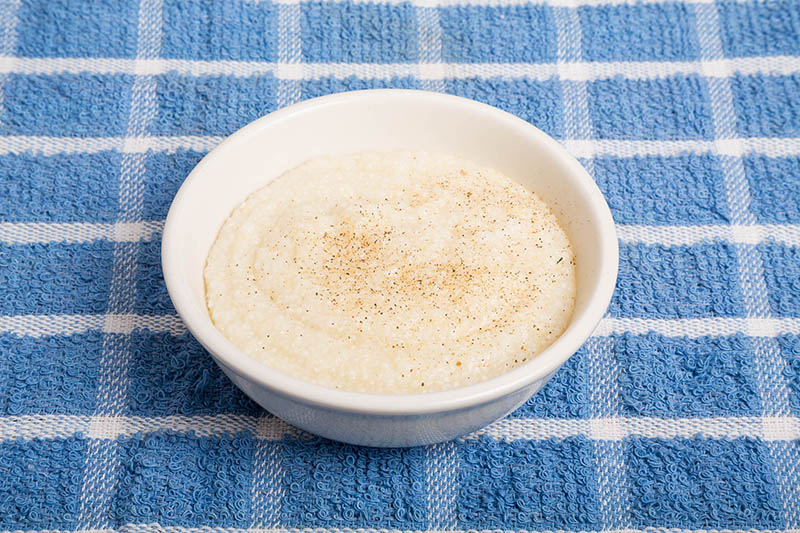Click to Skip Ahead
Grits are a popular breakfast staple, especially in southeastern U.S. states. Grits are derived from white corn kernels and are a quick and easy way to grab a little bite to eat before heading out the door in the mornings. You may have noticed your dog begging for a taste, which brings us to the question: can dogs eat grits? Is it safe?
The short answer is yes; you can feed your dog a small amount occasionally, as grits are not toxic for dogs. However, they must not contain seasonings or butter.
Is It Safe for Dogs to Eat Grits?
In order for grits to be safe for your dog to eat, they must not contain sugar, butter, or any other seasonings. It’s safe to give your dog a tablespoon of unseasoned grits on occasion, but they should never make up the bulk of your dog’s regular diet. Feeding your dog too many treats, such as grits, can either take the place of their regular nutritious diet possibly leading to deficiencies, or start to add extra calories that can lead to weight gain.
Grits are made from corn, which is not a toxic food for dogs, but a very small number of dogs may have corn allergies—in that case, you should never feed grits to your dog. If your dog has a corn allergy, feeding grits could cause unpleasant allergic reactions, such as red, itchy skin, hives, swelling, wheezing, vomiting, and diarrhea.

Do Grits Provide Nutritional Benefits for Dogs?
While grits provide nutritional benefits for humans, they provide little for dogs other than some calcium and iron. Grits are low in calories but high in carbohydrates, which is not beneficial for your dog and may lead to excess weight gain. They are also low in protein, which is a vital nutrient your dog needs to help maintain muscles, cartridge, tendons, ligaments, skin, coat, nails, and even blood formation.
Can I Feed Instant Grits to My Dog?
Grits come in various forms: stone-ground, regular, hominy, and instant grits. With the exception of instant grits, the other forms are minimally processed, making these forms a safer way to give your dog grits on occasion. However, instant grits are more processed, which means essential nutrients may be diminished during the process.
However, if the instant grits have no harmful ingredients, such as sugar, syrup, butter, or other added seasonings, they should not pose a health risk if your dog eats a small amount. Remember, grits should only be given on occasion and should not make up the bulk of your dog’s diet in the first place.
What Is an Ideal Diet for My Dog?
Dogs require complete and balanced nutrition consisting of proteins, fats, carbohydrates, vitamins, and minerals. Protein should be the first component listed in the ingredients list, and it should be of high quality, which usually means a whole meat source. When searching for dog food, ensure the food adheres to AAFCO’s nutritional standards and is 100% complete and balanced.
You can always seek your veterinarian’s advice on appropriate food for your particular dog. You should also ensure the food is age and breed-appropriate. For example, small dogs should eat food specifically made for small breeds, and large dogs should eat dog food specifically made for large breeds.

Conclusion
While grits are not toxic to dogs, it’s not a food a dog should eat often due to the lack of nutritional value and the potential for weight gain. Keep in mind that some dogs have corn allergies, which are where grits are derived from. If your dog has a corn allergy, it’s important to refrain from giving your dog grits. However, if your pooch has no corn allergy and you choose to let your pooch try a taste, ensure it has no added seasonings, butter, syrup, or sugar.
Featured Image Credit: Darryl Brooks, Shutterstock











